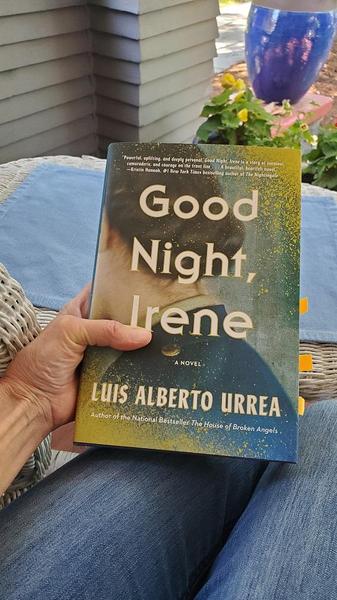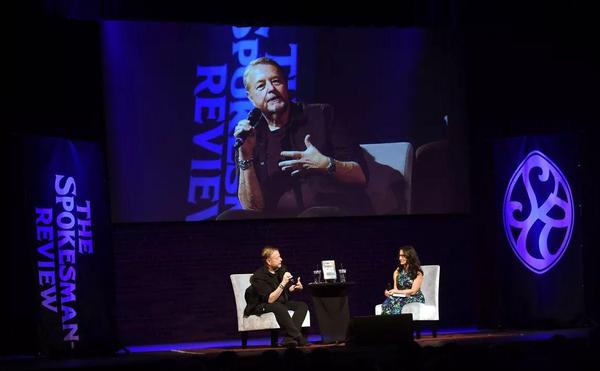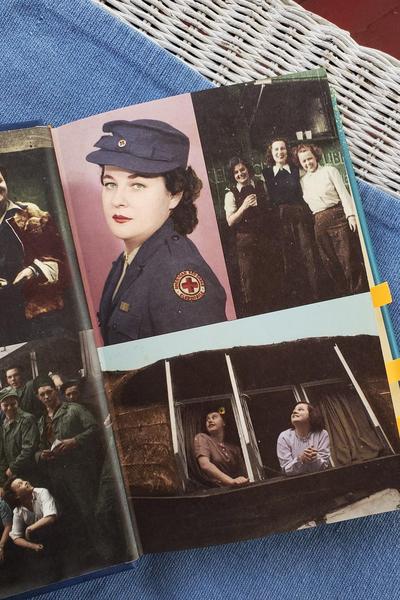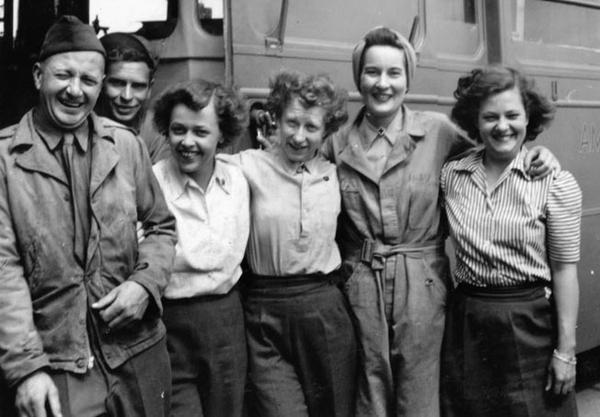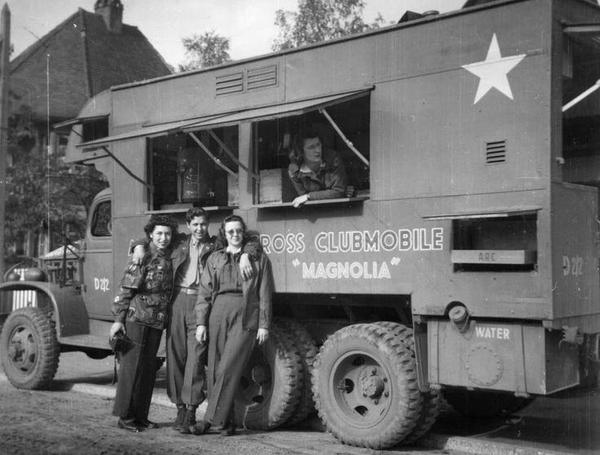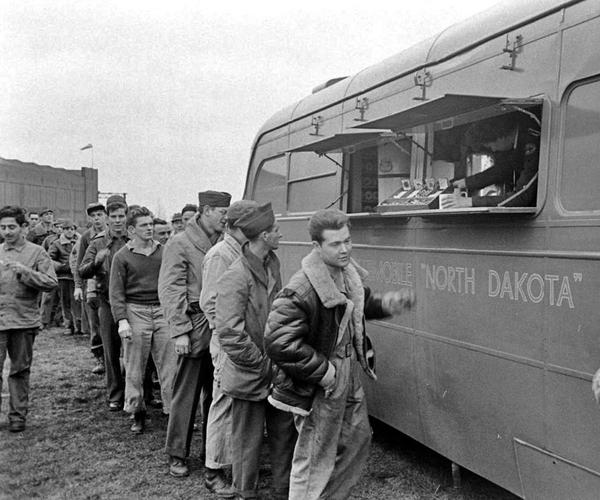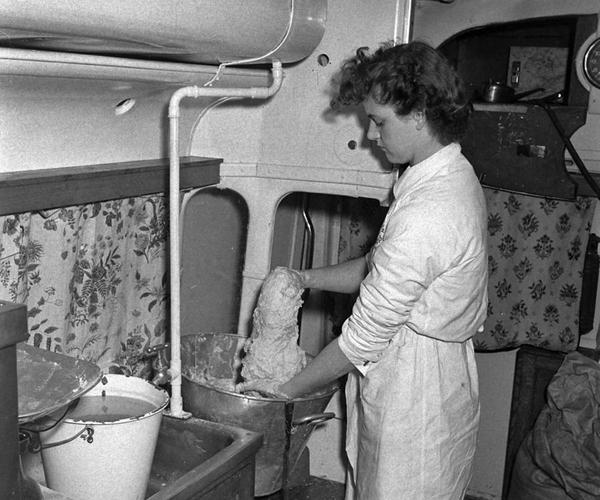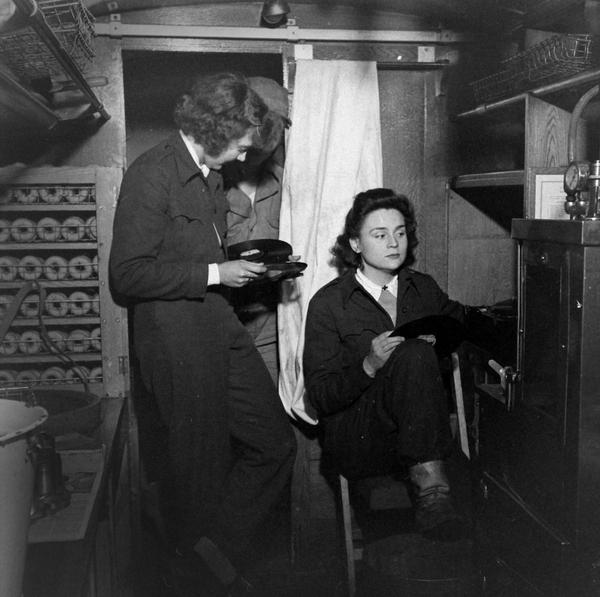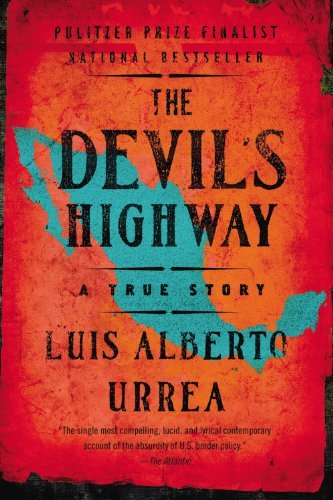2023 Hello , I was thrilled to take part in a wonderful event last week! Pulitzer Prize finalist Luis Alberto Uurea came through Spokane, WA, on tour publicizing his newest book Good Night, Irene. Very soon after starting to read this novel, I wished that I had written it, or rather, written a nonfiction book about the
Donut Dollies of World War II. These women served coffee, donuts and a slice of home to soldiers on the front lines of battle.
I could not have written this book because Luis Alberto Uurea based it on the true-life experiences of his mother, Phyllis Irene McLaughlin, who traveled across Europe with Patton's army. It's a great adventure story of women's strength, friendship and sacrifice.
Don't Call Us Donut Dollies!
After reading the book, I had the honor of interviewing the author on stage for The Spokesman-Review’s Northwest Passages book club last week at the
Bing Crosby Theater in downtown Spokane. Read more about that night here...
Luis Alberto Urrea
answers a question from me at The Spokesman-Review’s Northwest Passages book club event July 6, 2023 at the Bing Crosby Theater in downtown Spokane, WA. The fictional account follows closely the actual service route traveled by Phyllis and her partners Jill Pitts and Helen Anderson in the clubmobile Cheyanne. They saw Utah Beach, shortly after D-Day, skirmishes across France, where right in the middle of the Battle of Bastogne and
the horrors of the Buchenwald death camp. The first Red Cross Clubmobile arrived in France
just days after the D-Day invasion, and that summer, 80 of the modified two-and-a-half-ton GMC trucks trundled across the countryside serving the troops, not just refreshments, but music, laughter and dancing. In their training before leaving the US, the women were taught how to let the soldiers win at board games, talk about baseball and provoke a smile. Over months at war, they became trustworthy listeners, as soldiers took them aside to confess broken hearts, or fear, or shame or guilt...whatever they had to get off their chest and had no one else they could talk to in
the middle of a war. During WWII, the women hated being called Donut Dollies,
but since then, as their contributions to the war effort become more well-known and honored, the name had gained a deeper meaning. And clubmobilers, their official name, is so awkward.
Photos on the fly leaves of the book show Phyllis Irene McLaughlin in
her Red Cross uniform (top right) and Phyllis, Jill Pitts Knappenberger and Helen Anderson respectively (left to right) in front of the Cheyenne. (top left). Not unusual for the Red Cross women to find themselves behind enemy lines, as did Luis's mother, who hid in a barn covered with hay, while first German and then Russian soldiers attacked local women. She listened all night to their screams, so terrified, she prayed the
soldiers would stay busy and not find her. Luis
said she could not forgive herself for that, and it became the root of nightmares later in life. Many nights as a teen, he was unable to sleep, hearing his mother's nightmares, her crying and yelling through the night. "And it was not often what she’d seen but what she had heard. And I think that’s what damned her. I think that’s what she heard at night when she tried to sleep,” Luis told me. Phyllis was serious injured at the end of the war, and suffered from physical pain along with what we now understand is Post Traumatic Stress. Luis Alberto Uurea, is the author of more than twenty books including fiction, nonfiction and poetry,
planned to write a nonfiction book on his mom's wartime experience until he found that fire had destroyed the WWII records. The project languished until he discovered (Jill Pitts) Knappenberger lived not a two-hour drive away. On a visit he discovered the 95-year-old had a great memory and a trove of letters, diaries and photos to supplement those of his mother. "That's when the novel was born," he said. In the novel, the character Irene is modeled on Phyllis and the character Dorothy stands in for Jill. But have hearing the author talk about the two women, it's difficult for me to separate the women from the
characters in the story.
Phyllis at right and Jill, second from right, pose with the others in
their crew and two soldiers. Friendship
is at the crux of the novel. Two women from very different backgrounds, one from New York City, the other an Indiana farm woman, rub elbows in a tiny kitchen on wheels for days on end. At night they often sleep side by side under the truck because they are safer there if a bomb hits the truck. The women enjoyed their freedom far from home, had hilarious fun and faced the dangers of battle unarmed. Their friendship is forged in steel the day the Dorothy says to Irene: "I think about my duty...and I think about you. We are all we have right now. You and me. I think about us getting through this...I will walk
through fire for you. I need to know you will do the same for me...this is our story." Irene embraced her friend. The two held each other, and though Irene wanted to speak, she could not. She trusted no words. But she trusted Dorothy to know what was true." Below, to give you a picture, is the crew and driver of the Magnolia clubmobile "somewhere in Europe." They hauled their own water and gas tanks, regularly refilled by
Army suppliers.
Above, the boys line up for service at the North Dakota.
Virginia 'Ginny' Sherwood, Captain of the North Dakota crew Age
24, from Portland Oregon mixes the dough for donuts.
Dorothy 'Mike' Myrick, Age 24, Whiting, Indiana, and Katherine
'Tatty' Spaatz age 22 (no home state) select records to play on the Victrola and broadcast over the loudspeaker mounted on the outside of each truck. Note the rack of donuts ready to go at the left of the photo. More than 7,000 young women volunteered for service with the Red Cross during World War II. One enticement for some was that,unlike the Woman's Army and Navy corps, they were guaranteed service overseas. At the recent event in Spokane Luis Alberto Urrea said Good Night, Irene, "means “everything to me. I’ve put everything I know as a writer into
it, and I’m comfortable knowing that I can’t reach this height again.”
Like my article today? Please share:
Luis Alberto Urrea, born in Tijuana and now living outside Chicago is the author of fiction, nonfiction and poetry.
n the spring of 2001, 26 men left their homes in their home state of Veracruz, Mexico heading north, eventually they crossed the border into the Arizona Desert, the deadliest region in North America known as the Devil's Highway. Urrea tracks their footsteps revealing exactly what happened
when they entered into the desert wasteland. "Their enemies were many: the U.S. Border Patrol (“La Migra”); gung-ho gringo vigilantes bent on taking the law into their own hands; the Mexican Federales; rattlesnakes; severe hypothermia and the remorseless sun, a “110
degree nightmare” that dried their bodies and pounded their brains." Twelve men survived. Fourteen did not.
Follow me on social media
Read a great book? Have a burning question? Let me know. If you know someone who might enjoy
my newsletter or books, please forward this e-mail. I will never spam you or sell your email address, you can unsubscribe anytime at the link below. To find out more about my books, how I help students, teachers, librarians and writers visit my website at www.MaryCronkFarrell.com. Contact me at
MaryCronkFarrell@gmail.com. Click here to subscribe to this newsletter. |
|
|
